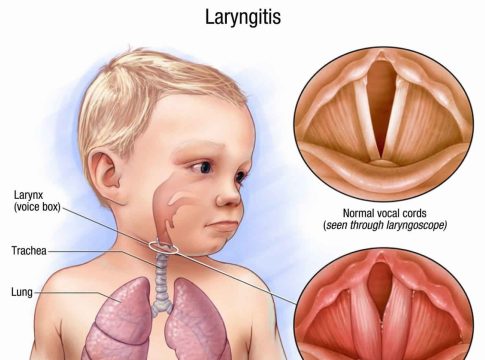On both sides of the larynx, there are two skin-folds known as vocal chords. The loosening or tightening of vocal; chords results in the formation of recognizable sounds and speeches. The coat of smooth and thin mucus layer on the vocal chords keeps them lubricated. This mucus lubrication normally thins or dries out due to the swelling of the chords due to an inflammation of the larynx by a bacterial or viral infection. This results in a raspy or hoarse voice usually accompanied by a cough or fever.

Virus and Bacteria
Though viral infections are the most common causes of Laryngitis, a bacterium with similarities to streptococcus is responsible for a few of these cases. Common cold, flu, pneumonia and bronchitis are symptoms of infections that lead to Laryngitis. These symptoms cause coughing that leads to the swelling and inflaming of the vocal chords. Generally, fungal infections are seen in victims that take inhaled steroids or those that have been immunocompromised. Cancer and infections from particular parasites may as well cause Laryngitis.
Generally, Laryngitis could occur due to excessive yelling, screaming and singing loudly for long duration of time due to an irritation of the vocal chords, which may become inflamed and obstruct the airway. Laryngitis may occur due to direct or passive smoking or being around harmful fumes, which irritate and eventually inflame the vocal chord mucous membrane.
Croup
Croup is an illness that affects children and may cause Laryngitis. It results in wheezing, hoarseness, a bark-like cough, cold symptoms, fever and difficulty in swallowing and eating. Another childhood illness that may be related to Laryngitis is known as epiglottitis. Epiglottis is the flap covering the trachea or windpipe, which prevents aspiration when swallowing. When the epiglottis swells, this causes fever and difficulty when swallowing. Epiglottitis results from a bacterial infection with the immediate symptoms. It is a dangerous condition since the trachea may become quite narrow resulting in the child experiencing breathing problems. Chronic Laryngitis is a situation where the condition lasts for a period longer than three weeks. Irritants generally cause this condition over time. It results from the vocal chords being strained. Additionally, growths on the vocal chords (nodules or polyps) could lead to the condition. Other causes apart from smoking include; inhaled irritants, acid reflux, excessive use of alcohol and habitual voice overuse.
On both sides of the larynx, there are two skin-folds known as vocal chords. The loosening or tightening of vocal; chords results in the formation of recognizable sounds and speeches. The coat of smooth and thin mucus layer on the vocal chords keeps them lubricated. This mucus lubrication normally thins or dries out due to the swelling of the chords due to an inflammation of the larynx by a bacterial or viral infection. This results in a raspy or hoarse voice usually accompanied by a cough or fever.

Virus and Bacteria
Though viral infections are the most common causes of Laryngitis, a bacterium with similarities to streptococcus is responsible for a few of these cases. Common cold, flu, pneumonia and bronchitis are symptoms of infections that lead to Laryngitis. These symptoms cause coughing that leads to the swelling and inflaming of the vocal chords. Generally, fungal infections are seen in victims that take inhaled steroids or those that have been immunocompromised. Cancer and infections from particular parasites may as well cause Laryngitis.
Generally, Laryngitis could occur due to excessive yelling, screaming and singing loudly for long duration of time due to an irritation of the vocal chords, which may become inflamed and obstruct the airway. Laryngitis may occur due to direct or passive smoking or being around harmful fumes, which irritate and eventually inflame the vocal chord mucous membrane.
Croup
Croup is an illness that affects children and may cause Laryngitis. It results in wheezing, hoarseness, a bark-like cough, cold symptoms, fever and difficulty in swallowing and eating. Another childhood illness that may be related to Laryngitis is known as epiglottitis. Epiglottis is the flap covering the trachea or windpipe, which prevents aspiration when swallowing. When the epiglottis swells, this causes fever and difficulty when swallowing. Epiglottitis results from a bacterial infection with the immediate symptoms. It is a dangerous condition since the trachea may become quite narrow resulting in the child experiencing breathing problems. Chronic Laryngitis is a situation where the condition lasts for a period longer than three weeks. Irritants generally cause this condition over time. It results from the vocal chords being strained. Additionally, growths on the vocal chords (nodules or polyps) could lead to the condition. Other causes apart from smoking include; inhaled irritants, acid reflux, excessive use of alcohol and habitual voice overuse.

